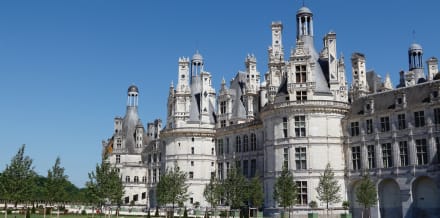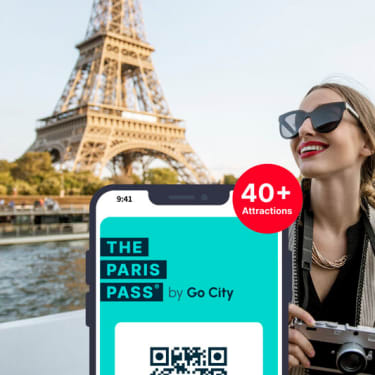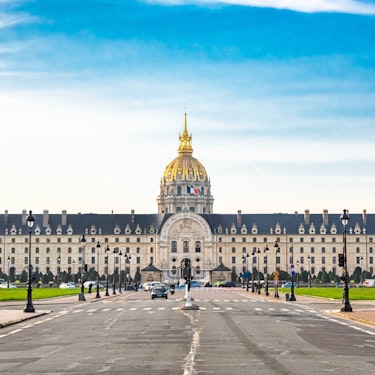More about: 3 Best Day Trips to Loire Valley Castles from Paris
Escape to the Loire Valley, a region listed as a UNESCO World Heritage Site. It's close enough to Paris to spend a day among the châteaux before returning to the capital just in time for dinner.
What there is to see and do in Paris is not limited to its perimeter. You only have to wander a little further afield to find dreamy places like Versailles, Monet's House in Giverny and, of course, the Loire Valley with its romantic châteaux. Here are the best guided tours to the latter destination from the City of Light.
1. Day trip to the Loire Valley

There is no shortage of reasons to visit the Loire Valley. Important battles were fought here, kings lived here and some of the best grapes in the country are harvested here. The monarchs embellished the land with magnificent residences that continue to amaze locals and tourists alike.
Guided tours depart early in the morning (usually around 7:00) from a central Parisian location and include entrance fees to the monuments.
The Loire Valley's fortresses and châteaux are innumerable, but the following châteaux are the most popular destinations for tours:
- Château de Chambord, an imposing square building with four towers. It was built in the 16th century at the behest of King François I. The monarch was a passionate hunter and chose the site for its abundance of wild game. Chambord is reminiscent of Italian Renaissance buildings and conceals a double helix staircase designed by Leonardo da Vinci.
- Chenonceau, the second most visited royal residence in France after the Palace of Versailles. It is a romantic fantasy built on the river Le Cher. Chenonceau is linked to the figure of Catherine de Medici who snatched it from Diane de Poitiers, the mistress of her husband, King Henri II.
- Château Royal d'Amboise, the castle that hosted the Gallic monarchs during the Renaissance. From its towers and high points, there is a magnificent view over the river and the surrounding village.
In most cases, these day tours include a tasting of three glasses of wine and a stroll through Amboise, the charming historic village that is home to the castle of the same name.
In 1516, Leonardo da Vinci moved here taking with him his most famous painting: La Gioconda. His room and workshop are located in the Château du Clos-Lucé (Rue du Clos Lucé 2).
- Duration: about 12 hours
- Price: about 200 €.
2. Two-day trip to Mont Saint-Michel and the Loire Castles

These tours normally depart from the French capital at around 7am. The first stop is Mont Saint-Michel, the picturesque village perched on the slopes of a rocky hill. You'll arrive here just before midday, the ideal time to find a place to eat.
Day 1
Mont Saint-Michel is tiny but there are a few worthwhile restaurants. An icon of the village is La Mère Poulard, famous for its lamb, fish dishes and the famous omelette cooked over a wood fire. Other recommended destinations include the creperie La Sirene and the Auberge Saint-Pierre.
With a full belly, a walk is best enjoyed and the famous village of Normandy deserves to be explored in every nook and cranny. Your guide will take you to the abbey which conceals a splendid cloister. Originally, the temple had a Romanesque architecture whereas today it has a Gothic exterior.
After the visit, and some free time for a stroll around Mont Saint-Michel, the bus will take you to nearby Angers where you will spend the night in a hotel.
Day 2
Day 2 starts with a hearty breakfast at the hostel. Once finished, the bus will take you to the Loire châteaux. Routes usually stop at the fortresses of Chenonceau and Chambord and at the Château de Langeais.
The latter is one of the oldest in the valley and is remarkable for its Renaissance façade. It was built in the 10th century by Fulk III of Anjou, one of the most important figures of the French Middle Ages.
The most impressive room is the wedding hall which hosted the marriage of King Charles VIII and Anne of Brittany in 1491. Wax figures commemorate the event.
In the afternoon, the coach sets off on its return journey to Paris. The vehicles usually arrive in the French capital around 8pm, the ideal time for dinner. For inspiration, I recommend reading the post on the best restaurants in Paris.
- Duration: 2 days
- Price: around €450
3. Three day tour to Normandy and the Loire Castles

The second tour is different from the previous one. Here, you will see the châteaux after visiting the main towns of Normandy.
The tour takes place on board a luxury coach and includes two nights in a hotel, an expert guide, entrance fees to the main sights and some meals (usually breakfast and lunch).
Day 1
The first stop is usually Rouen, the former capital of Normandy and the perfect starting point for exploring the region. Its landmark is Notre-Dame Cathedral, a jewel of French Gothic architecture. It has inspired a series of paintings by Monet depicting it at different times of the day. Some of these are kept in the Musée d'Orsay in Paris.
After a stroll through the old town, you'll get back on the bus until you reach the Atlantic coast. The bus routes usually stop at the following towns:
- Honfleur, a seafaring town that had its golden age in colonial times. Its historic centre (Vieux-Bassin) is built around the old harbour and the houses lining it create a picture-postcard image. You'll usually have plenty of time to explore Honfleur at your leisure. If you're feeling peckish, you can enjoy fresh seafood at one of the many speciality restaurants.
- Omaha Beach, the site of the famous Normandy landings
- Saint-Laurent American Cemetery, where 9,387 American soldiers killed in battle are eternally buried.
- Landing Museum, the cultural institution that preserves the memory of D-Day. It stands above the artificial harbour built after the conquest of the coast.
The day usually ends in Caen, a town with a rich history behind it. Its most famous admirer was William the Conqueror who embellished it by having a castle and the abbeys of Men and Ladies erected.
Day 2
In the morning you will leave Caen and head for the Corsair city of Normandy: Saint-Malo. It is a real fortress on the sea and is surrounded by well-preserved ramparts. The old buildings are made of grey granite which gives a severe yet elegant touch.
It is also worth going out of the old town to see the neighbourhood next to the Sillon beach (Plage du Sillon). Here you will find some splendid villas built during the Belle Époque. For lunch, I recommend you to have some crepes overlooking the sea at La Caraque (quai de Solidor 3).
In the afternoon you will visit another pearl of Normandy: Mont Saint-Michel. It is a "magical island" that loses and regains contact with the mainland according to the tides. Your guide will take you inside the abbey that has been guarding the site since the 8th century.
You will then have time to stroll around the cobbled streets at your leisure. The route ends in Angers where you will spend the night.
Day 3
Finally, the third day concentrates on the topic of this article: the castles! Normally, the châteaux of Chenonceau and Chambord are included, while the Château Royal d'Amboise is off the route. Instead, you will have the opportunity to visit other forts:
- Château d'Angers, the most unique fortress in the region. The builders used exclusively tufa, a limestone with a typical grey colour. This detail together with the 17 towers that protect it give it the appearance of an impregnable fortress.
- Château de Langeais, one of the oldest castles in the valley. It had a dual residential/military function and is therefore surrounded by large ramparts. On the Parapet Walk (Chemin de Ronde) it will not be difficult to imagine soldiers throwing boiling oil to repel attackers.
As usual, you will have time for lunch in Chenonceau. For this purpose, I recommend the restaurants Au Gâteau Breton (Rue Bretonneau 16) and Auberge de la Treille (Rue d'Amboise 2). You will return to the French capital in the evening.
- Duration: 3 days
- Price: around 700 €.
Why take a trip to the Loire Châteaux?

The Loire Valley is considered one of the best places to visit in France. The elegant fortresses are its main attraction but not the only one: gardens, medieval villages and large fields of sunflowers have contributed to this part of France being a UNESCO World Heritage Site.
Another attraction is the wine: Sauvignon Blanc, Cabernet Franc, Melon de Bourgogne, Chenin Blanc and other varieties are harvested here. If you're staying in Paris for a week (or more), I recommend you dedicate at least one day to this excursion.
When is the best time to visit the Loire Châteaux?

Most tourists visit the Loire Valley between July and August to enjoy pleasant temperatures - highs rarely exceed 26°C - and outdoor activities.
Some of the most popular are boat trips on the river, a hot-air balloon flight or a relaxing day on the banks of the Hommes and Chemillé-sur-Indrois lakes.
If you can't travel during these dates, spring is another recommended option. You will enjoy the spectacle of the flowering in the marvellous gardens of the area. The most notable are the Château de Villandry, the Château d'Azay-le-Rideau and the Château de Chenonceau, although the list could be longer.
Is it advisable to take a trip to the Loire Châteaux with children?

Of course it is! The little ones are often delighted to visit these unique constructions that are reminiscent of the protagonists of fairy tales, films and video games. In addition, many castles have developed audio guides for children and dedicated leisure/cultural activities.
If you are travelling with your children, you can also take other routes. To that end, I recommend you read the article on how to get from Paris to Disneyland and the post on excursions to Mont St Michel from Paris
Is it possible to visit the region on your own?

Yes, you will have the options listed below:
- Car: if you have decided to rent a car, it will be enough to drive for about two and a half hours. The main centre of the region is Tours, which can be easily reached via the A10 motorway.
- Train: if you want to get to Tours quickly, you can take a high-speed train from Montparnasse. You can also opt for a convoy from Austerlitz station to Blois-Chambord. You can check timetables and tickets on the French Railways website.
- Bus: the Flixbus company provides connections between the capital and Blois.
What are the advantages of taking a guided tour vs. visiting the Loire Valley on my own?

At over 1000 kilometres, the Loire is the longest river in France and its valley stretches for some 280 kilometres. This area is home to a wealth of châteaux and other attractions.
For this reason, planning a visit requires good organisation in advance. If you are short on time, an organised tour is ideal.
For a reasonable price, you will be provided with an expert guide, bus transport and entrance tickets to the châteaux you are going to visit. If you're staying overnight, you won't have to worry about accommodation either.






















